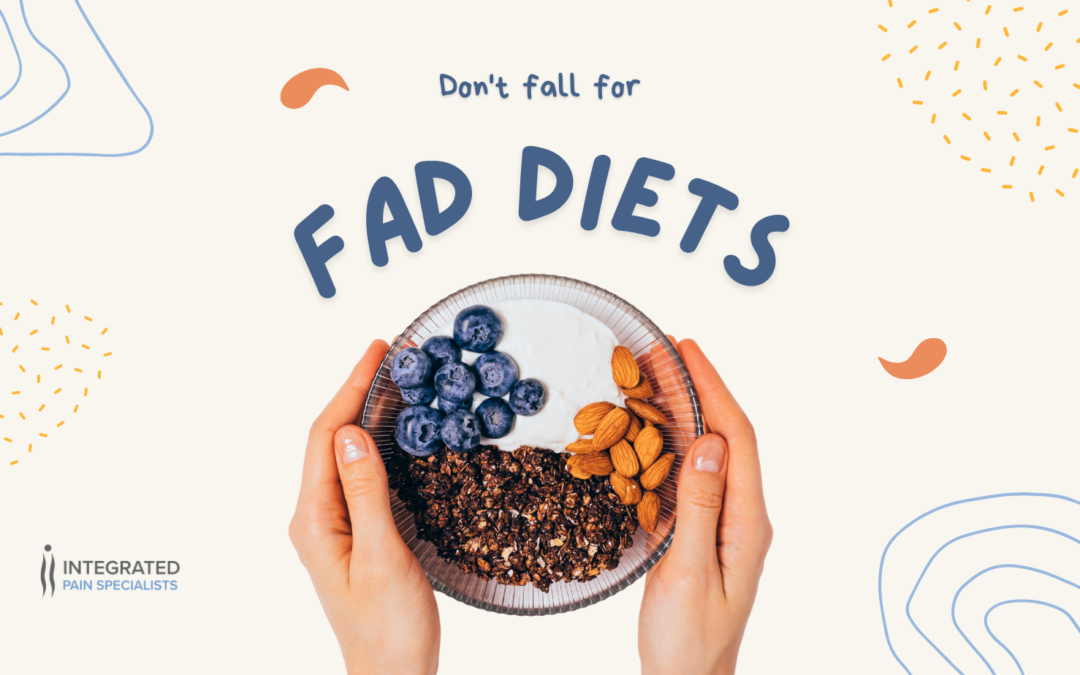When looking into weight loss, many people look for quick or easy solutions. With a fad diet, they have slowly become more popular over time. Although they may seem promising, they can be very deceiving or worse dangerous.
Fad diets are diets that become popular quickly but often lack scientific evidence to support their claims. These diets usually promise rapid weight loss or other health benefits, but often restrict certain foods or entire food groups, and may be difficult to sustain over the long term. Some common examples of fad diets include the Atkins diet, the South Beach diet, the paleo diet, and the keto diet.
While some people may experience short-term weight loss on fad diets, the weight loss is often unsustainable, and the restrictive nature of these diets may lead to nutrient deficiencies and other health problems. It is generally recommended to follow a balanced and varied diet that includes a variety of fruits, vegetables, whole grains, lean proteins, and healthy fats.
Fad diet signs
When looking into a healthy diet plan, it is important to do your research and talk with one of our health coaches at Integrated Pain Specialists. Here are some of the top signs to look for when researching a healthy diet plan.

Promises rapid weight loss
Diets that promise rapid weight loss can be dangerous for a number of reasons. First, these diets often require severe caloric restriction or the complete elimination of certain food groups, which can lead to nutrient deficiencies and a lack of energy. Second, rapid weight loss can result in the loss of muscle mass along with fat, which can slow down your metabolism and make it harder to maintain weight loss over the long term.
Third, many fad diets do not promote healthy eating habits or sustainable lifestyle changes, which means that the weight loss is often temporary and can lead to yo-yo dieting.
In addition to these physical health risks, rapid weight loss can also have negative effects on mental health. The pressure to lose weight quickly can lead to feelings of guilt and shame if the diet is not successful, and the obsession with food and weight can contribute to disordered eating patterns and body dysmorphia.
It’s important to remember that sustainable weight loss takes time and effort, and there are no shortcuts or quick fixes. The best approach is to focus on making gradual, healthy changes to your diet and lifestyle that you can maintain over the long term. It’s also a good idea to consult with one of our health coaches at Integrated Pain Specialists or your healthcare provider to develop a personalized plan that is safe and appropriate for your individual needs and goals.
Requires food elimination
Diets that require the complete elimination of certain food groups can be dangerous for a number of reasons. Eliminating entire food groups can lead to nutrient deficiencies, which can negatively impact your health over the long term. For example, if you eliminate all sources of carbohydrates from your diet, you may not be getting enough fiber, which can lead to digestive problems and other health issues. If you eliminate all sources of fat from your diet, you may not be getting enough essential fatty acids, which can impact brain function and overall health.
Diets that require food elimination can be socially isolating and may lead to disordered eating patterns. For example, if you eliminate all sources of gluten from your diet, you may struggle to find options when dining out or attending social events. This can lead to feelings of anxiety and stress, which can trigger disordered eating behaviors.
When you eliminate entire food groups from your diet, it can be challenging to stick to the diet for an extended period of time. This can lead to feelings of deprivation, which can result in binge eating or a return to old, unhealthy eating habits.
In general, it’s best to follow a balanced and varied diet that includes a variety of fruits, vegetables, whole grains, lean proteins, and healthy fats.
If you have specific dietary needs or concerns, it’s a good idea to consult with one of our health coaches at Integrated Pain Specialists or your healthcare provider to develop a personalized plan that is safe and appropriate for your individual needs and goals.
Severely restricts calories
Diets that require strict calorie intake can be dangerous for a number of reasons. First, severe calorie restriction can lead to nutrient deficiencies, as it can be difficult to get all of the vitamins, minerals, and other nutrients your body needs on a very low calorie diet. This can negatively impact your health over the long term, and can even lead to serious health problems like anemia, osteoporosis, and immune system dysfunction.
Diets that require strict calorie intake can lead to disordered eating patterns and other psychological issues. When you’re constantly counting calories and restricting your food intake, it can be easy to develop an unhealthy relationship with food. This can lead to anxiety, depression, and other mental health problems, and can even trigger eating disorders like anorexia or bulimia.
In general, it’s best to follow a balanced and varied diet that includes a variety of fruits, vegetables, whole grains, lean proteins, and healthy fats. If you’re looking to lose weight, it’s important to do so in a slow and steady manner, with a focus on making sustainable lifestyle changes that you can maintain over the long term. It’s also a good idea to consult with one of our health coaches at Integrated Pain Specialists or your healthcare provider to develop a personalized plan that is safe and appropriate for your individual needs and goals.

Key elements to healthy weight loss
While there are many factors that can contribute to healthy weight loss, variety, exercise, and consistency are certainly important elements to consider.
Variety
Eating a variety of nutrient-dense foods can help ensure that your body is getting all of the vitamins, minerals, and other nutrients it needs to function properly. Variety can also help keep your meals interesting and prevent boredom, which can lead to unhealthy snacking or binge eating.
Exercise
Regular physical activity can help you burn calories, build muscle, and improve overall health. Exercise can also help boost your mood and reduce stress, which can improve your mental health and help prevent emotional eating. Aim for at least 30 minutes of moderate-intensity exercise most days of the week, or as recommended by your healthcare provider.
Consistency
Making healthy choices consistently over time is key to achieving and maintaining weight loss. This means sticking to a balanced and varied diet, getting regular exercise, and making other healthy lifestyle choices like getting enough sleep and managing stress.
Contact Integrated Pain Specialists
It’s important to remember that healthy weight loss is a gradual process that requires patience and persistence. It’s also important to consult with one of our registered dietitians or one of our health coaches to develop a personalized plan that is safe and appropriate for your individual needs and goals.

